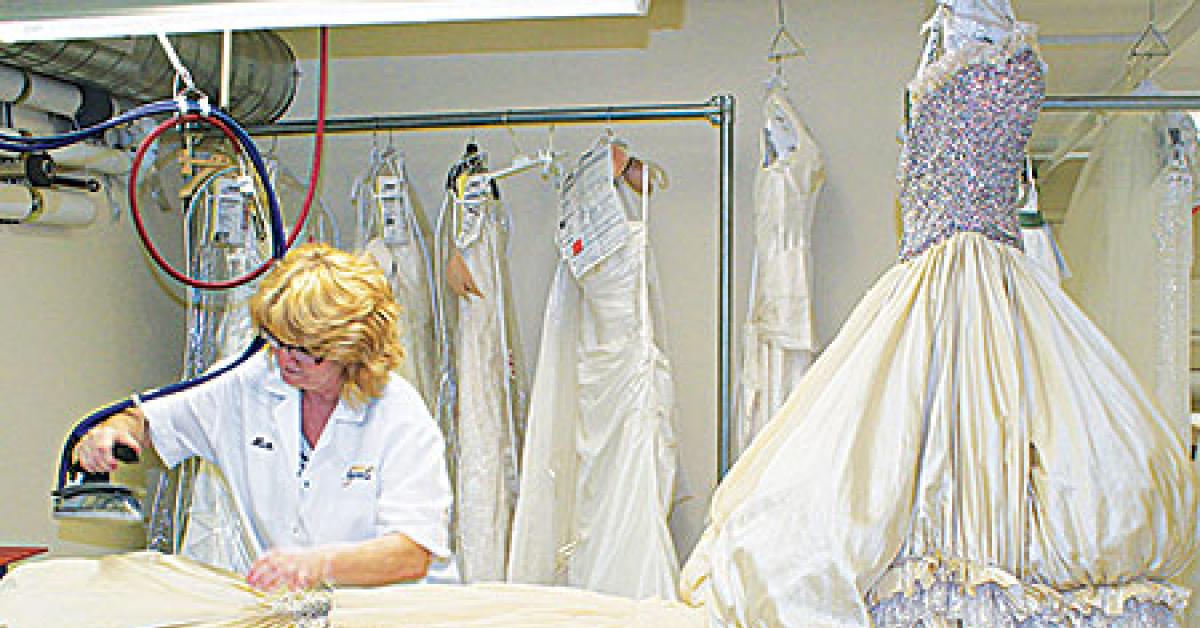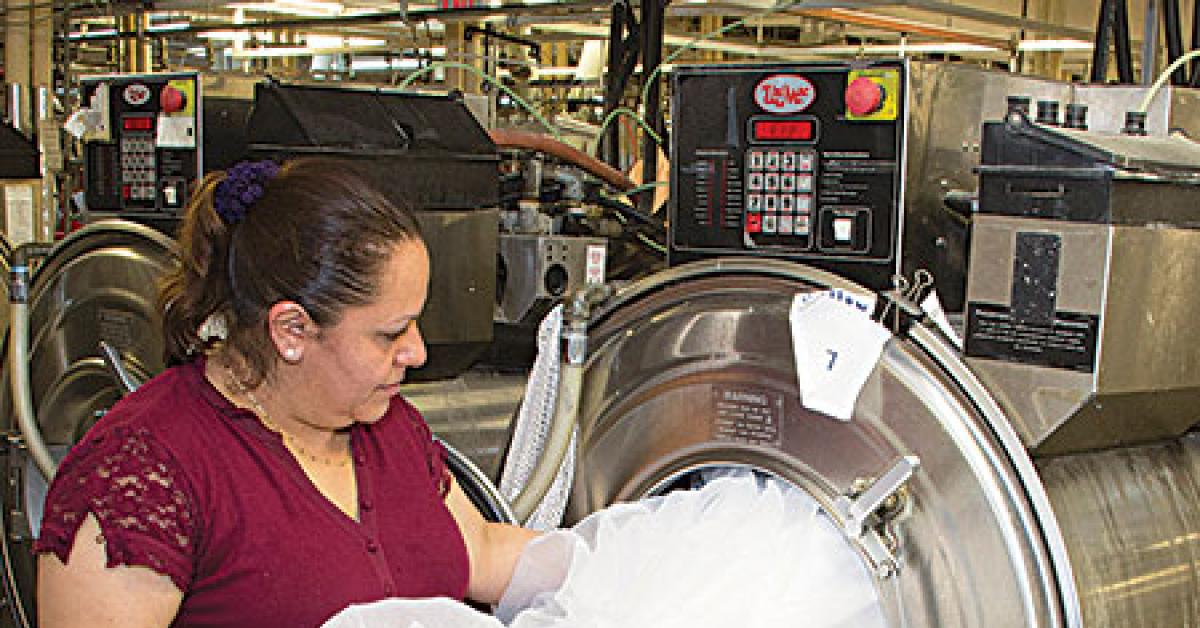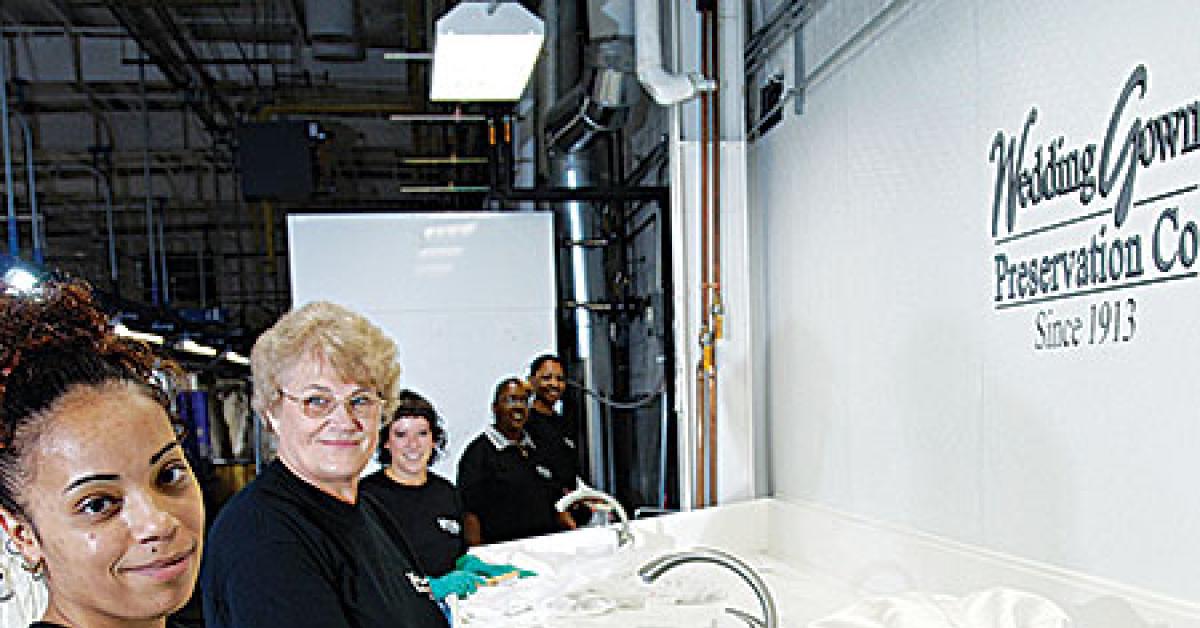CHICAGO — Wedding gowns, christening gowns and the like carry special significance to their owners and require a high level of attention and care.
This month, American Drycleaner invited representatives from three businesses and organizations devoted to garment preservation to answer some basic questions about what it takes to provide such services and how they meet the challenges that come with the territory.
Sally Lorensen Conant, Ph.D., operates Connecticut-based gown preservation service Orange Restoration Labs and is the executive director of the Association of Wedding Gown Specialists, a not-for-profit trade association that has members in 10 countries that focus on the care of specialty gowns. Association members share their experiences and promote the brand with designers, wedding publications and wedding websites.
Kyle Nesbit is vice president of business development for Memories Gown Preservation, a Texas-based gown preservation company that services more than 90,000 bridal gowns annually. MemoriesGP provides wholesale, environmentally friendly gown cleaning, preservation, packaging and shipping services to bridal salons, tux shops and dry cleaners across the continental United States.
Michael Schapiro is president of the Wedding Gown Preservation Co., a family-owned and -operated business based in New York that celebrated its centennial last year. Schapiro is the third generation of his family to run the business.
While there may be slight differences in their approach, each described utilizing a highly detailed process for receiving, logging, cleaning and packaging the cherished and oft-delicate garments, as well as communicating with customers throughout.
Q: Describe the importance of good customer service in the acceptance, tracking and delivery of garments received for preservation and/or heirlooming.
Conant: At the counter, the garment’s owner wants to know he or she can trust the process from beginning to end. For example, the last thing a bride wants is someone else’s gown, and a good system incorporates multiple identifiers—ideally including a photograph—that can locate the garment at any point in time.
At the counter, it is also important to point out problems, document them, and discuss them calmly. That is, never scold anyone or promise the garment will look like new, especially if the hem is a ‘hot mess.’
Nesbit: The importance of good customer service is imperative when dealing with items customers have such an emotional connection with. To ensure great customer service, our reps are trained to understand our entire preservation process so that they can answer customer questions and help customers efficiently, in a friendly manner.
Schapiro: We have six customer service representatives available to answer questions or explain our service. We receive hundreds of calls and e-mails each week from brides on where to have their gowns preserved. Our customer service representatives direct the brides to our closest authorized dry cleaner.
Keeping the dry cleaner and bride informed on the status of their gown is important. Wedding Gown Preservation sends an e-mail to the dry cleaner and bride when their gown arrives at our facility. A second automated e-mail containing the tracking number is sent when her completed gown is shipped from our facility.
Q: Given the sentimental and often high monetary value of wedding gowns and similar ceremonial garb, how should insurance coverage be structured for the dry cleaner that offers preservation services?
Schapiro: Our service includes a $500 declared value. Dry cleaners have the option to purchase additional declared value up to the full purchase price of the garment they are sending. Declared value covers the gown during both processing and shipping.
Nesbit: At MemoriesGP, along with other national preservation companies, we have standard declared value insurance set at $500 included with each of our preservation kits. If a customer wants to declare the garment at a higher value, we charge $5 for every additional $500 over the standard $500 included.
Conant: Our members know the value of garments, especially if they are vintage ceremonial clothing or high-dollar items made by famous names. Very probably, things that are going to be preserved will also be on hand for longer periods of time than ordinary clothing. Our members protect themselves with insurance that covers not only the value of everything in the plant but also specific high-dollar items. If an insurance policy limits the coverage for a single item to an amount such as $5,000, it is not enough protection for garments that often cost a great deal more than $5,000.
Q: Is running/managing a cleaning business that offers garment preservation services more difficult than running/managing one that does not? If so, why?
Conant: Finding the time and space to work on special garments can be challenging, in particular when stains require treatment over a period of days or even weeks. Also, most cleaners have a pretty good idea of how many shirts per day they can expect, but gowns, for example, can arrive in clumps of five or 10 in the wedding season. However, unless a bride is experiencing “separation anxiety” and wants her gown processed immediately, there is usually no rush to return it.
Nesbit: I wouldn’t say that the preservation business is harder to manage than a retail dry cleaner, it’s just different. As a wholesaler, MemoriesGP has two customers to satisfy: the retailer that ‘owns the bride’ and the brides themselves. Also, as stated before, these garments have more sentimental value than a laundered shirt or dry-cleaned blouse. These truths require that the preservation business maintains an additional level of customer service and professionalism.
In both businesses, though, it’s really about focusing on core competencies. Our staff has to be managed to understand that it’s our job to come in each and every single day and make sure we process each and every garment properly, over and over.
Schapiro: Running a wholesale preservation company is multi-faceted. There are many variables. The seasonality of gown preservation requires hiring in the early summer and tapering down in the fall. We have had very good success recruiting on college campuses for summer employment. Our college students can focus on making boxes, hanging gowns and shipping. This lets our experienced staff focus on gown cleaning, pressing and repair.
Miss Part 1? You can read it HERE.
Have a question or comment? E-mail our editor Dave Davis at [email protected].



